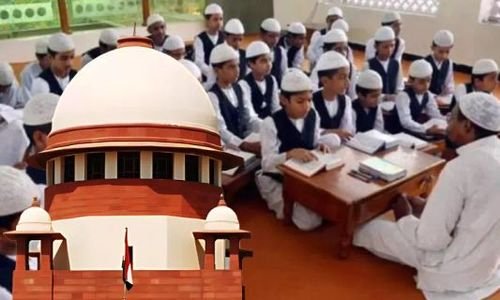SC Upholds UP Madarsa Act Validity
The Supreme Court of India has upheld the constitutional validity of the Uttar Pradesh Board of Madarsa Education Act, 2004, reversing the Allahabad High Court's earlier ruling that declared the Act unconstitutional and violative of the principle of secularism. The Act regulates the functioning of madrasas in Uttar Pradesh, providing a framework for their education and certification.

https://newshedline643.blogspot.com/2024/11/blog-post_5.html
Background
The Allahabad High Court had struck down the Act in March 2024, citing its alleged violation of secularism and the principle of equality. The High Court had ordered the Uttar Pradesh government to accommodate madrasa students in the formal schooling system. However, the Supreme Court stayed the High Court's verdict in April 2024, allowing the Madarsa Board to continue functioning pending the apex court's decision.
Supreme Court Ruling
A three-judge bench, led by Chief Justice of India DY Chandrachud, delivered the verdict on November 5, 2024. The Court held that the Madarsa Act does not violate the basic structure of the Constitution or infringe upon minority rights. The judges emphasized that the state has a positive obligation to protect minority rights while ensuring that educational standards are maintained.
Key Findings
- Constitutional Validity: The Supreme Court upheld the constitutional validity of the Madarsa Act, rejecting the Allahabad High Court's finding that it was unconstitutional.
- Secularism: The Court clarified that secularism does not mean the suppression of minority rights or the prohibition of religious education. Rather, it means "live and let live," allowing for the coexistence of different educational systems.
- Legislative Competence: The Supreme Court affirmed the Uttar Pradesh government's legislative competence to enact the Madarsa Act, which regulates educational standards in madrasas without infringing upon the secular fabric of the educational system.
- Conflict with UGC Act: The Court identified specific provisions of the Madarsa Act that conflicted with the University Grants Commission (UGC) Act of 1956, relating to the conferment of degrees. These provisions were declared unconstitutional.
- Education Standards: The Court emphasized the need for madrasas to adhere to national standards, aligning with Article 21A of the Constitution, which guarantees the right to education.
Implications
- Continuation of Madrasa Education: The Supreme Court's verdict allows madrasas in Uttar Pradesh to continue functioning, regulated by the Madarsa Board.
- Recognition of Certificates: However, certificates beyond Class XII issued by madrasas will not be recognized by the UP Madrassa Board.
- Protection of Minority Rights: The Court's decision ensures the protection of minority rights, allowing for the preservation of minority educational institutions and their unique character.
Conclusion
The Supreme Court's upholding of the Madarsa Act's constitutional validity is a significant relief for the 13,000-odd madrasas in Uttar Pradesh, which can now continue to function under the regulatory framework established by the Act. The Court's emphasis on the need for madrasas to adhere to national standards and its clarification on secularism will help ensure the coexistence of different educational systems in India.